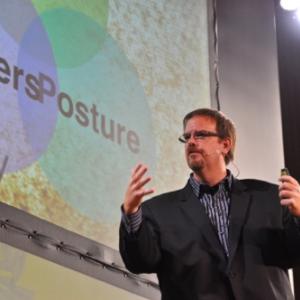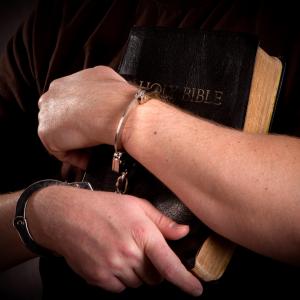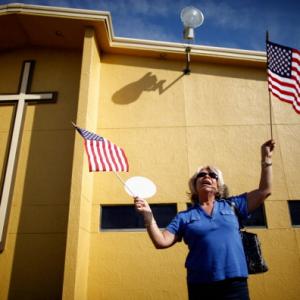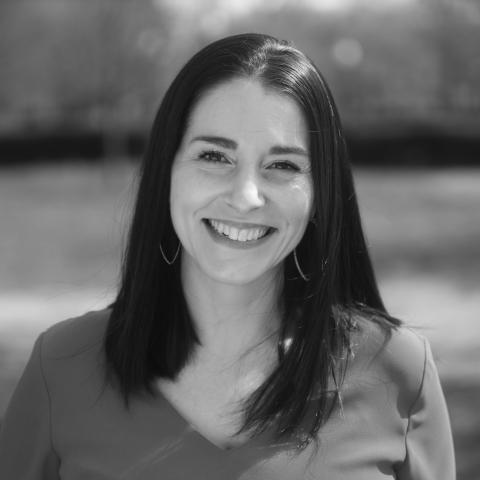
Sandi Villarreal is former editor-in-chief of Sojourners. She came to Sojourners in 2012 after starting her career in print newspaper reporting and veering quickly into digital media and online journalism. Sandi holds a master's degree in journalism from the Medill School of Journalism at Northwestern University and a bachelor's degree in journalism and political science from Baylor University. She has worked in both print and online journalism, publishing, digital marketing, and nonprofit community development.
Sandi is most interested in writing about the intersection of faith, politics, and culture, especially as it relates to women's leadership both within our churches and on the political stage. Sandi has earned awards for her news and commentary writing, as well as for her work as editor of Sojourners' online publication.
Posts By This Author
Millennials Find Distinction Between Personal Morality and Common Good
College-aged adults are not letting their moral beliefs on social issues filter into their politics.
According to the just released “Millennial Values Survey” by the Public Religion Research Institute and Berkley Center for Religion, Peace and World Affairs at Georgetown University, adults age 18-24 are much less likely than their parents to cite social issues like abortion (22 percent) or same-sex marriage (22 percent) as critical.
While the group is split on social issues personally, it doesn’t factor into its political reality. For example, while 51 percent believe abortion is morally wrong, 59 percent believe access to abortion should be legal. Likewise, 48 percent believe sex between members of the same gender is morally wrong, but 59 percent favor allowing same-sex couples to legally marry.
The gap is also evident in their religious affiliation. The percent of religiously unaffiliated jumped from 11 percent in childhood to 25 percent now.
Their attitudes toward Christianity paint a picture of possible motives behind the shift. Two-thirds say that Christianity can be described as “anti-gay,” and 62 percent believe present-day Christianity is “judgmental.”
The full survey will be released this morning at Georgetown University. Check back with Sojourners for more coverage of the findings.
Sandi Villarreal is Associate Web Editor for Sojourners. Follow Sandi on Twitter @Sandi.
Catholic Leaders Say Rep. Paul Ryan Distorting Church Teaching
In response to Rep. Paul Ryan’s recent comments justifying the Republican budget plan on Catholic grounds, 60 prominent Catholic leaders today released a statement saying his claims “profoundly distort” Catholic teaching.
“Simply put, this budget is morally indefensible and betrays Catholic principles of solidarity, just taxation and a commitment to the common good,” the statement reads. “A budget that turns its back on the hungry, the elderly and the sick while giving more tax breaks to the wealthiest few can’t be justified in Christian terms.”
John Gehring, Catholic Outreach Coordinator at Faith in Public Life, believes Ryan’s beliefs are skewed.
“This budget turns centuries of Catholic social teaching on its head,” Gehring said in a news release. “These Catholic leaders and many Catholics in the pews are tired of faith being misused to bless an immoral agenda.”
Read the full statement and signatories HERE.
Q Conference: Restoring the Justice System
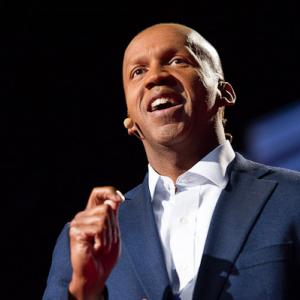
Bryan Stevenson delivering a TED talk in California last month. Photo via Wiki Commons (http://bit.ly/IqqTaf)
The United States has the highest incarceration rate in the world with 23 million behind bars. Bryan Stevenson of the Equal Justice Initiative, speaking from the Q Conference on Wedensday, said this high rate is inextricably tied to poverty, age, mental illness and race.
“In this country, the opposite of poverty is not wealth. The opposite of poverty is justice,” said Stevenson, a law professor at the New York University school of Law. “If we’re going to be concerned about ending poverty, we must be concerned about justice.”
Q Conference - Miroslav Volf On Faith in Public Life

Miroslav Volf. Photo via Wiki Commons (http://bit.ly/HABnUJ).
An interconnected, interdependent world means a greater intermingling of faiths and the possibility for conflict. We’ve seen it in the United States in anti-Shariah legislation and the recent atheist Reason Rally.
Theologian Miroslav Volf, director and founder of the Yale Center for Faith and Culture, argues that globalization and the resurgence of faith in the United States increases the need for pluralism in public life.
Q Conference - Ed Stetzer and The Future of Discipleship
Share the gospel at all times, and when necessary use words.
The phrase is usually attributed to St. Francis of Assisi and is often invoked by the timid Christian, the too-cool hipster Christian, and basically every Christian ever who is afraid of evangelism.
Ed Stetzer—president of LifeWay Research, speaking from the Q conference on Tuesday—said there are two problems with that statement: it’s not true, and Assisi never said it.
“We don’t want to separate those two because biblically we can’t, and statistically we don’t,” Stetzer said.
Jim Wallis and Richard Land on Finding Common Ground
How different would the state of our political system—and the tenor of the election season—be if voters and politicians on both sides decided to speak civilly?
Sojourners CEO Jim Wallis and the Southern Baptist Convention’s Richard Land spoke at the Q conference Tuesday on the topic “What Can We Agree On?”
The intention is to acknowledge difference but—as Christians—focus on the areas of agreement based on our biblical understanding.
Cascarones, or, Hitting is OK Because It's Easter
Growing up, Easter weekend meant a giant family party at my grandparents’ house complete with a piñata, Easter egg hunt, possibly a mariachi band, and – on at least one occasion – my younger cousins dressing up to perform the Passion play.
But the best part (you know, besides celebrating Jesus resurrecting from the dead, providing salvation for the world)?
Cascarones!
Parents: Take Your Children to See 'Bully'
Tyler Long, 17, hanged himself more than two years ago after being teased and bullied. He joined countless others and more since who have been pushed to the limit and taken their own lives. Bully, which premieres Friday, chronicles the lives of Long’s family, along with five other children tormented on a daily basis.
Bully shows students who are mocked for their sexual orientation both by peers and teachers; they endure beatings on school buses; they have profanities hurled at them—which earned the movie an “R” rating by the Motion Picture Association of America.
MPAA’s decision sparked protests and petitions from anti-bullying groups and eventually made the Weinstein Company, which produced the documentary, release the film unrated.
I watched the film. Bully disturbs me on a basic human level—but not because of the profanity (which is probably fairly mild to the average teen). Bully disturbs me because it is real life. It disturbs me because I have younger brothers the same age as some of the students in the film. It disturbs me because it’s happening in the lives of our children all around the country.
Beyond Denominations: Jesus' Prayer to Be 'Perfectly One'
I’ve written a lot about what it really means to be the Church. And by “Church,” I mean the Church—not Baptist, Lutheran, Catholic—Jesus’ Church. The communion of believers, and all that.
“The glory that you have given me I have given to them, that they may be one even as we are one,I in them and you in me, that they may become perfectly one, so that the world may know that you sent me and loved them even as you loved me.” – John 17:22-23
Jesus wants his followers to be “perfectly one” so that the world may know Him.
The Hunger Games Movie Misses the Point
Editor’s Note: This review may include spoilers if you have not seen the movie or read the book.
I really didn’t want to read The Hunger Games. I had resisted the time sucks that were the Harry Potter and Twilight series. I’m too old for such nonsense.
But about two months ago, my friends settled on the trilogy for our next book club pick. After some initial whining, I gave in. Our last selection was Cutting for Stone—I could use a mental break. Of course, the inevitable happened. I was engrossed so completely that I flew back to Minneapolis for opening weekend and book club.
Our group of seven twentysomethings settled in with our themed cocktails among the hordes of fans, ready to be wowed. Later at our debrief in the rented-out sky club at my old apartment building—we were serious about this—we settled on a resounding “eh.”
Chaplains Say More Prisoners Switching Religions
Religious conversions are on the rise in American prisons, according to a recent national survey of chaplains by the Pew Forum on Religion and Public Life.
A majority of 730 chaplains surveyed say that inmates are switching religions a lot (26 percent) or some (51 percent, and the largest gains are Muslim (51 percent), Protestant (47 percent) and pagan or earth-based religions (34 percent).
But it is difficult to determine prisoners' motivations for converting, according to Cary Funk, senior researcher for the Pew Forum.
“Some of the switching may be short-lived,” Funk said, adding that it is unclear whether the conversions are based on authentic beliefs or access to certain privileges such as special food or religious holidays.
Updated: Clooney Arrested at DC Protest (Video)
Actor George Clooney was arrested during a protest outside the Sudanese embassy in Washington, D.C. Friday morning.
Pastor Who Granted Sanctuary to Meet with ICE Officials
The Rev. Seth Kaper-Dale, a New Jersey pastor who granted sanctuary to an Indonesian immigrant, is scheduled to meet with a U.S. Immigration and Customs Enforcement public advocate on March 20.
But Kaper-Dale said he remains skeptical given the wording in the invitation.
“It’s an invitation to talk, but [says] ‘you’re breaking the law,’” he said.
Saul Timisela—who fled to the U.S. to escape religious persecution 14 years ago—has now lived in the Reformed Church of Highland Park in Newark, NJ for two weeks, avoiding deportation.
How to Measure the 'Evangelical Vote'
In Tuesday’s Mississippi and Alabama primaries, about eight of 10 voters identified as evangelical, locking in victories for former Sen. Rick Santorum, and proving once again the importance of the evangelicals in the election.
Presidential hopefuls are again battling it out to be the God candidate, but the tide of the so-called “evangelical vote” seems ever-shifting. Santorum—a Catholic—is doing better to court most evangelicals, while former Massachusetts governor Mitt Romney — a Mormon — is beating out Santorum among Catholics. And according to a recent poll, Republicans in the Deep South are still questioning whether President Barack Obama is a Muslim.
Religion matters.
But what does the “evangelical vote” even mean anymore? And can any one candidate really claim it? Even with Santorum’s win Tuesday, a significant number still fell into Romney’s column — and that’s just among Republican evangelicals. Obama was able to draw some evangelical support in 2008 and could garner more in November.
Young Evangelicals: Unaffiliated Does Not Always Mean UnChristian

"Meet the Millennials," photo by TheeErin/Wylio (http://bit.ly/yZ7ZF9).
There has been a lot of talk lately — both in the public sphere and most definitely here at the Sojo offices—about young people leaving the church.
I would argue that--while some of my fellow millenials are jumping ship on Christiainity--many are not so much leaving the big-C “Church,” (see my post on the definition of the word), as they are leaving established churches. The surveys show a migration from a particular denomination to “no religion.” To me, that doesn’t say atheist/agnostic; it just says that this generation of Christians doesn’t want to be labeled.
If you look at the numbers, millenials are quitting the church, not quitting Jesus. Unaffiliated does not necessarily mean unChristian.
My generation doesn’t want the “Southern Baptist,” “Wisconsin Evangelical Lutheran Synod,” “Roman Catholic” affiliations thrust upon us. Not only do we disagree with some of the tenants of said denominations, but each title carries all sorts of baggage left at our feet.
We’ve seen post after post listing possible catalysts to twenty-somethings turning away from the religion of our fathers in droves. Presidential hopeful Rick Santorum blames college. The reasons listed here on God’s Politics, in books and by church leaders themselves each probably factor in to some degree.
But I do want to dismiss some of them.
God's Church is Not a Building
What is a church?
Is it the stained-glass windows or welcome bell mounted in the steeple? Is it the straight-backed pews or scent of incense wafting into the narthex? Sunday school classrooms or spaghetti dinners in the basement?
If you view a church as a building, what happens when it goes away?
According to Reuters, 2011 was a record year for church foreclosures:
“Since 2010, 270 churches have been sold after defaulting on their loans, with 90 percent of those sales coming up after a lender-triggered foreclosure, according to the real estate information company CoStar Group," the article reads. "In 2011, 138 churches were sold by banks, an annual record, with no sign that these religious foreclosures are abating, according to CoStar.”
Christians Can Find Humor in 'GCB'
It’s a television show that 1) follows “Desperate Housewives” and 2) only got “meh” ratings for its Sunday premiere, so I was slightly taken aback by the mini-firestorm over ABC’s new “GCB.”
The show, based on the book Good Christian Bitches by Kim Gatlin and starring Annie Potts and Kristin Chenoweth, is getting heat from conservatives and Christian groups for portraying Christians in a poor light for their cattiness, opulence, and overall … well, bitchiness. (Don't worry; I'm female. I get to say that.)
New York City Councilman Peter Vallone is going so far as calling for a boycott of the show, saying,” the title of the show alone is yet another outrageous attack on the Christian faith. Charlie Sheen will be back on ‘Two and a Half Men’ before we see a similar title targeting another religion.”
Contraception and Common Decency
I was raised half-Catholic and half-Southern Baptist in Texas, so Rush Limbaugh made an auditory appearance now and again in my car growing up. One of my early memories was discovering a new term: “feminazis.”
These dangerous women were unkempt, outspoken, and downright ungodly, if you believed Limbaugh. Then I reached about age 14. I was actually going to be a woman and maaaaybe this was kind of insulting. I realized that Limbaugh was often self-admittedly absurd—a shock-jock. I stopped taking him seriously.
So when he spit out his latest attack on women and outrage followed, I wondered whether I should even be surprised. What came out of his mouth was disgusting, but this is a man who doesn’t believe in the existence of sexual harassment.
